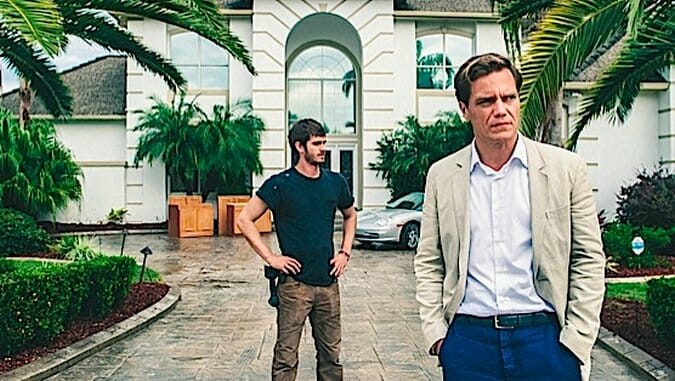99 Homes (2014 TIFF review)

As a filmmaker, Ramin Bahrani is more chronicler than storyteller. In movies like Chop Shop and Goodbye Solo, he has observed individuals up close, letting their rhythms dictate the flow of his films. His latest reveals some of the limitations of such an approach. 99 Homes is strongest when it captures the anger and desperation of those affected by the recent collapse of the housing market, but the narrative engine is far less propulsive. When Bahrani is not at the top of his game, the milieu is more interesting than what the people in that world do.
Andrew Garfield stars as Dennis Nash, an Orlando single father whose family home is about to be foreclosed on. The man who comes to his door to deliver the bad news is Rick Carver (Michael Shannon), a shady realtor who carries a concealed weapon because of past altercations. Nash despises Carver, but because he’s desperate for a job he accepts work from the realtor. Nash is handy—he used to work in construction—so he starts off doing manual labor, but soon he graduates to being Carver’s right-hand man, becoming more involved in the realtor’s unscrupulous business practices.
By means of comparison, 99 Homes could be Bahrani’s Wall Street, a story about an idealist who gets corrupted by the allure of riches. The interesting wrinkle is that Nash’s road to hell is actually paved with cynicism—at the banks that stole his home and the government that turned its back on him. Deciding that there really isn’t any such thing as personal ethics anymore, Nash spearheads Carver’s plan to buy up troubled homes for low money and then flip them for a huge profit. (He also steals air conditioners and water pumps from Carver-owned foreclosed houses so that Carver can charge the government for replacement ones.) Nash goes into all this with open eyes: As far as he’s concerned, he’d rather be the one screwing somebody else than getting screwed himself.
This mindset dominates the landscape of 99 Homes. Characters fall into two camps: winners and losers. There are far more of the latter as the evicted are forced to live in shitty hotels, beg the courts for leniency, and rail at the Carvers of the world who are making a killing off of their misery. This is a movie about the pain and shame of unemployment, of falling outside the margins of society, of watching the American dream pass you by.
-

-

-

-

- Curated Home Page Articles By Test Admin October 21, 2025 | 3:10pm
-

- Curated Home Page Articles By Test Admin October 21, 2025 | 2:57pm
- Urls By Test Admin October 21, 2025 | 2:57pm
- Curated Home Page Articles By Test Admin October 21, 2025 | 2:55pm
-

-

-

-

-

-

-

-

-

-

-

-

-

-

-

-

-

-

-

-

-

-

-

-

-

-

-

-

-

-

-




































